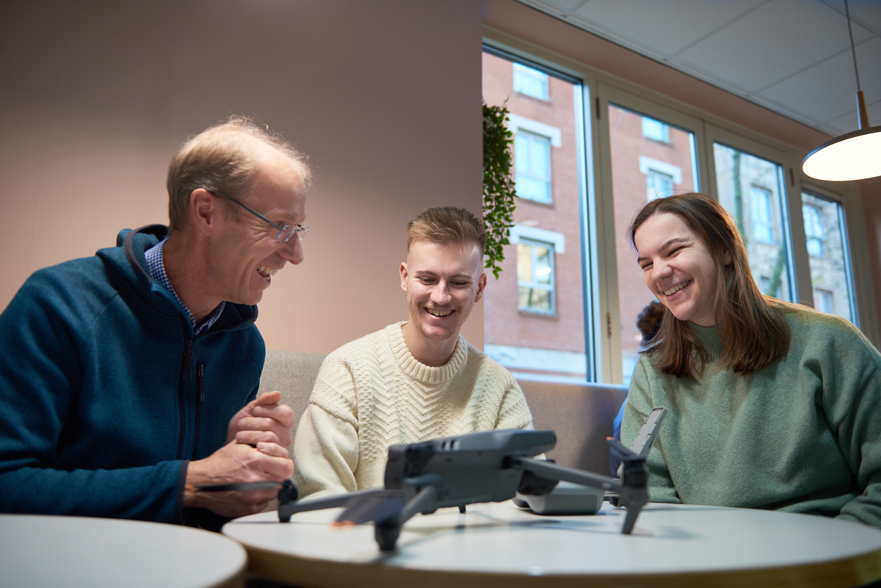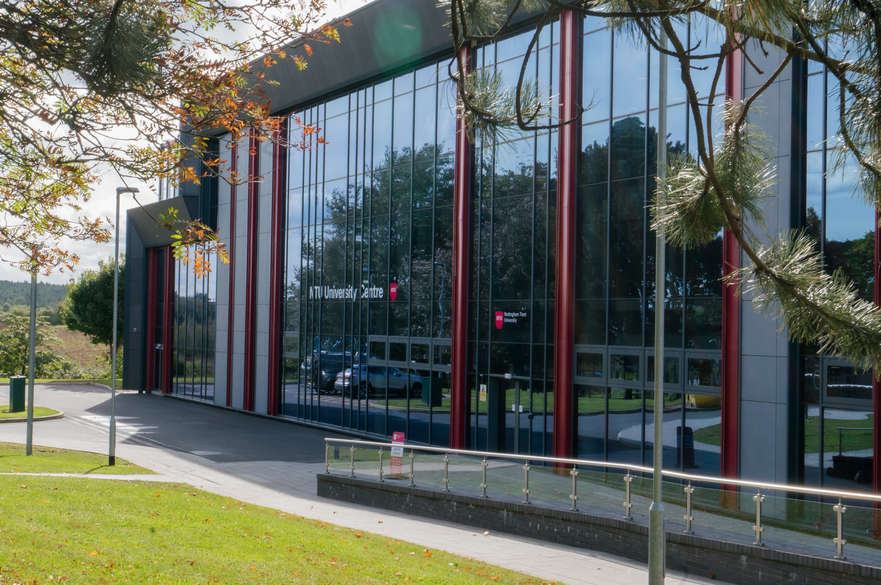This course is in Clearing
Offers from 48 tariff points
About this course
To meet the UK's 2050 net-zero goal, this cutting-edge programme focuses on sustainable construction, aligning with the booming low/zero-carbon sectors. Acquire the knowledge and skills to lead in transforming the built environment, capitalising on emerging employment opportunities.
Centered on modern construction methods, this course addresses the industry's carbon footprint. Dive into applied work to tackle technical, social, and economic challenges in the shift to zero carbon.
With a focus on design, manufacture, and installation using advanced technologies in the construction, you'll gain essential skills for a construction, civils and services industry prioritising global de-carbonisation and sustainability. Elevate yourself as a reflective professional ready to make a positive impact.
-
You'll study at our NTU in Mansfield University Hub, where you'll have access to fantastic buildings, and all of the tools and technology you need for studying on this course.
-
The course is delivered full-time for two days per week, enabling you to fit learning around your work and other commitments. You'll also have opportunities to undertake additional placements during the year.
-
This course prepares you to progress to a range of roles in the construction industry and the opportunity to continue your studies on a university degree course.
-
Developed in collaboration with a range of employers, students and subject experts, this course is designed to meet the changing needs of industry.
10
What you’ll study
This course explores the construction and built environment sector including civil engineering & building services engineering, emphasising building design, off-site construction, and emerging technologies. Practical experiences, including industry projects and placements, provide opportunities for collaboration, client interaction, and real-life scenario evaluations.
The programme aims to develop flexibility, resilience, and key transferable skills valued by employers, ensuring students are well-prepared for the dynamic demands of the construction industry.
Principles of Alternative Energy (15 Credit Points)
- Buildings account for significant global resource consumption, prompting governments to legislate and incentivise alternative energy technologies like solar, wind, heat pumps, and biofuels for sustainable construction.
- You’ll develop your knowledge of current and future energy technologies, enabling you to design and assess alternative energy systems for the construction industry.
Construction Technology (15 Credit Points)
- This module explores the technological and philosophical aspects of modern construction techniques, supported by case studies and laboratory work to inspire self-development and further studies.
- You’ll focus on industrial and commercial buildings, international construction methods, and materials, emphasising sustainability and understanding modern and traditional building technologies.
Digital Applications for Construction Information (15 Credit Points)
- Building Information Modelling (BIM) and data management are essential for planning, construction, and operation, driving efficiency, cost reduction, and sustainability in projects of all sizes.
- You’ll cover key processes for using digital tools to support BIM, with opportunities for vendor certification in industry-standard BIM systems.
Tender & Procurement (15 Credit Points)
- Construction technology principles remain unchanged, but evolving materials and techniques address resource scarcity, demand for higher-quality, flexible, and energy-efficient buildings, driven by financial, environmental, and legal constraints.
- You’ll study the technological concepts used to construct building elements, focusing on understanding the functional characteristics and design considerations when selecting the most suitable solutions from substructure to completion.
The Construction Environment (15 Credit Points)
- Construction is a key driver of economic growth, impacting finance, property, employment, and various factors beyond the buildings and infrastructure it creates and maintains.
- The construction industry is a major contributor to CO2 emissions and has ongoing environmental impacts through building design, construction, and maintenance. As a major employer, it also affects working conditions and career development. Students will explore its impact on the environment and society.
- Students will explore the roles and relationships within the construction sector, focusing on how it improves the built environment, reduces environmental impact, and sustains economic growth.
Building Information Modelling (15 Credit Points)
- This modules provides foundational knowledge of Building Information Modelling (BIM), covering its drivers, benefits, terminology, and its role in managing the relationship between design, construction, and operation of assets.
- This module equips you with the knowledge of BIM's importance in construction roles and its potential influence on your future career decisions.
Construction Design Project (15 Credit Points)
- This module focuses on the design process and technical information required for project success, covering project phases, construction drawings, CAD, BIM, specifications, and project management.
- Upon completion, you will be able to analyse scenarios, make decisions, and create innovative home design proposals with drawings and specifications.
Principles of Off-site Construction (15 Credit Points)
- Modern construction still follows traditional principles, but off-site construction offers benefits in efficiency, accuracy, and quality by reducing delays, defects, and poor working conditions.
- This module explores off-site construction approaches for housing, including modular construction, automation, and 3D printing, enabling students to assess options and develop strategies for efficient housing design and delivery.
We regularly review and update our course content based on student and employer feedback, ensuring that all of our courses remain current and relevant. This may result in changes to module content or module availability in future years.
How you're taught
In your Higher National Certificate programme, you'll be actively engaged through diverse learning approaches, both individually and collaboratively. Small group activities and discussions, along with learning technology like podcasts and online tools, offer flexibility and accessibility. Access module resources in different formats, tailored to your learning needs and professional development goals.
The programme, designed for work-based learning, incorporates input from employers to ensure practicality and cost-effectiveness. Explore various teaching strategies, including workshops and one-to-one support through face-to-face or distance learning technologies.
Seminars and lab sessions
You'll have seminars and lab sessions, where you'll apply theory learned to real-world situations. These sessions involve active learning and are driven by collaboration with your tutors and classmates. Due to the smaller class sizes, this approach enables individualised support to ensure you reach your learning potential.
Input from industry
Industrial input into your learning will help prepare you for the workplace or further study. We have great connections with local employers in Nottingham and the surrounding areas. Our industry partners are involved in offering optional industry-focused projects and work placement opportunities, as well as embedding live projects into your learning throughout the course. Our relationship with industry will also benefit you in expanding your network and hearing from professionals in practice.
How you're assessed
Assessment in the course includes diverse methods such as practical tasks, reports, presentations, portfolios, and group projects. Some modules involve online or in-person seminar contributions, with coursework often based on employer-set themes, allowing real-world application. The varied assessment methods aim to showcase achievements, enhance communication skills, and provide feedback throughout each module. Self, peer, and group assessments may be incorporated, emphasising both individual understanding and collaborative skills development.
Careers and employability
Further study
Students who successfully complete the HNC Modern Methods of Construction for England course will have the opportunity to progress to one of the following courses:
- BSc (Hons) Construction Management full-time, part-time or sandwich routes (Year Two entry)
- BSc (Hons) Quantity Surveying and Commercial Management full-time, part-time or sandwich routes (Year Two entry)
- BSc (Hons) Building Surveying full-time, part-time or sandwich routes (Year One entry)
- Level 6 Degree Apprenticeship Pathways:
- BSc (Hons) Property Development and Planning (Year One entry)
- BSc (Hons) Property Finance and Investment (Year One entry)
- BSc (Hons) Real Estate (Year One entry)
Employment opportunities
The course's focus on specialist technical skills and knowledge provides students with a clear set of skills and goals for entering employment. Typical jobs related to this course may include:
- Civil Engineering Project Manager, Civil Engineering Technician, Building Services Engineering Project Manager, Site Supervisor Civil Engineering/BSE Engineering, Quantity Surveyor Civil Engineering, BSE, Tunnel Surveyor, Housing Design Technician, Housing Project Manager, Off-site Construction Manager, BIM Technician, Digital Design Technician, Architectural Technologist, Planning Officer, Building Control Officer.
Employability team
Our expert Employability team will work closely with you at every stage of your career planning, providing personal support and advice. You can benefit from this service at any time during your studies and for up to three years after completing your course.
NTU Enterprise
You'll also have the opportunity to turn your ideas into a viable business with help from NTU Enterprise, NTU's purpose-built Centre for Entrepreneurship and Enterprise, a support centre to help students create, develop and grow their own businesses.
Campus and facilities
As an NTU Mansfield student, you’ll benefit from the latest facilities and modern technology to support your studies and help you get the most out of student life.
We are continually investing in our facilities and enhancing our learning and teaching environment to make it an inspiring place for students.
Plus, as a construction student, you'll have access to our Construction Lab and CAD suite with the latest industry specific design and software throughout your studies.
Facilities and services include:
- University Centre
- Teaching and Learning Centre
- Construction Lab
- CAD suite
- Library
- Dedicated study zones, including PC suites
- On-site café
- Social spaces
- Sports facilities
- Student Support Services
- Nottingham Trent Students Union (NTSU) drop-in events.
Entry requirements
This course is in Clearing
Looking for a place in Clearing? We are accepting application and would love to hear from you!
UK students
This course is in Clearing
Looking for a place in Clearing? We are accepting applications and would love to hear from you!
Clearing requirements
From 48 UCAS tariff points from up to 4 qualifications.
To discuss our entry requirements and see what we can offer you, call us now on +44 (0)115 848 6000. Alternatively, if you already have your qualifications, apply online via our Clearing Application form.
Preparing for results day? Beat the queue and sign up for NTU Priority for up-to-date information about all things Clearing. You’ll get an offer ahead of Clearing, subject to you achieving the required grades on results day.
The following qualifications will also be considered:
- Other related Level 3 qualifications
- Access to Higher Education Diploma from an approved further education institution
- Relevant work experience, or an international equivalent to the above qualifications.
To find out what qualifications have tariff points, please use our tariff calculator.
Additional requirements for UK students
There are no additional requirements for this course.
Contextual offers
If you don’t quite meet our entry requirements, we might be able to make you a lower offer based on a range of factors, including your background (such as where you live and the school or college you attended), your experiences and your individual circumstances (you may have been in care, for example). This is called a contextual offer, and we get data from UCAS to help make these decisions. We do this because we believe everyone with the potential to succeed at NTU should have the opportunity to do so, no matter what barriers you may face.
Meeting our entry requirements
Hundreds of qualifications in the UK have UCAS Tariff points attached to specific grades, including A-levels, BTECs, T Levels and many more. You can use your grades and points from up to four different qualifications to meet our criteria. Enter your predicted or achieved grades into our Tariff calculator to find out how many points your qualifications are worth.
Other qualifications and experience
NTU welcomes applications from students with non-standard qualifications and learning backgrounds, either for year one entry or for advanced standing beyond the start of a course into year 2 or beyond.
We consider study and/or credit achieved from a similar course at another institution (otherwise known as credit transfer), vocational and professional qualifications, and broader work or life experience.
Our Recognition of Prior Learning and Credit Transfer Policy outlines the process and options available for this route. If you wish to apply via Recognition of Prior Learning, please contact the central Admissions and Enquiries Team who will be able to support you through the process.
Getting in touch
If you need more help or information, get in touch through our enquiry form.
International students
This course is in Clearing
Looking for a place in Clearing? We are accepting applications and would love to hear from you!
Clearing requirements
From 48 UCAS tariff points from up to 4 qualifications.
To discuss our entry requirements and see what we can offer you, call us now on +44 (0)115 848 6000. Alternatively, if you already have your qualifications, apply online via our Clearing Application form.
Preparing for results day? Beat the queue and sign up for NTU Priority for up-to-date information about all things Clearing. You’ll get an offer ahead of Clearing, subject to you achieving the required grades on results day.
This course is not suitable for tier 4 visa applicants.
We accept qualifications from schools, colleges and universities all over the world for entry onto our undergraduate and postgraduate degrees. If you’re not sure how your international qualification matches our course requirements please visit our international qualifications page.
We have undergraduate Architecture courses which are suitable for tier 4 visa applicants. Here is a list of all the undergraduate courses we offer.
Additional requirements for international students
There are no additional requirements for this course.
English language requirements
View our English language requirements for all courses, including alternative English language tests and country qualifications accepted by the University.
If you need help achieving the language requirements, we offer a Pre-Sessional English for Academic Purposes course on our City campus which is an intensive preparation course for academic study at NTU.
Other qualifications and experience
If you have the right level of qualifications, you may be able to start your Bachelors degree at NTU in year 2 or year 3. This is called ‘advanced standing’ entry and is decided on a case-by case basis after our assessment of your qualifications and experience.
You can view our Recognition of Prior Learning and Credit Transfer Policy which outlines the process and options available, such as recognising experiential learning and credit transfer.
Sign up for emails
Sign up to receive regular emails from the International Office. You'll hear about our news, scholarships and any upcoming events in your country with our expert regional teams.
Getting in touch
If you need advice about studying at NTU as an international student or how to apply, our international webpages are a great place to start. If you have any questions about your study options, your international qualifications, experience, grades or other results, please get in touch through our enquiry form. Our international teams are highly experienced in answering queries from students all over the world.
Policies
We strive to make our admissions procedures as fair and clear as possible. To find out more about how we make offers, visit our admissions policies page.









